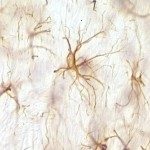Lien vers Pubmed [PMID] – 10572944
Biochim. Biophys. Acta 1999 Oct;1472(1-2):222-31
Human tonsils were assessed for their ability to 7alpha-hydroxylate pregnenolone (PREG), dehydroepiandrosterone (DHEA) and 3-epiandrosterone (EPIA). Both 7alpha-hydroxy-DHEA and 7alpha-hydroxy-EPIA were produced by homogenates of either whole tonsils or of lymphocyte-depleted tonsil fractions. In contrast, isolated lymphocytes were found to be unable to carry out 7alpha-hydroxylation. When co-cultures of tonsil-derived T and B lymphocytes were set up under stimulatory conditions, IgGs were released in the supernatants and could be quantitated, and immunomodulating properties of different steroids were monitored. When PREG was added to a mixture of tonsil-derived B and T lymphocytes, a decrease of non-specific and specific IgG was observed. An increase in specific anti-tetanus toxoid and anti-Bordetella pertussis antigen IgGs was obtained with either 1 microM 7alpha-hydroxy-DHEA or 1 microM 7alpha-hydroxy-EPIA. In contrast, DHEA and EPIA were unable to trigger such an effect. When cultures of isolated tonsillar B cells were used, none of the steroids tested showed significant effects on specific IgG productions. These data led to the conclusion that human tonsillar cells transform DHEA and EPIA, but not PREG, into 7alpha-hydroxylated metabolites. These metabolites could act on target tonsillar T lymphocytes which in turn act upon B lymphocytes for increasing specific IgG production.


